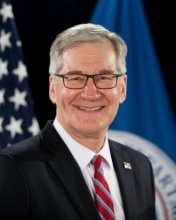
Why DHS causes more headaches for industry than any other agency
Some members of industry described a culture of fear within the Homeland Security Department, which holds them back from doing business with with DHS. The depar...
A culture of fear and lack of consistency at the Homeland Security Department are perpetuating a fractured relationship with some members of industry, who said they are less enthusiastic about working with DHS than they are with other federal agencies.
“The fact that people don’t want to do business with us is a big problem for me,” Russell Deyo, DHS undersecretary for management, said Nov. 9 at the Homeland Security and Defense Business Council’s DHS Enterprise symposium in Washington. “And I need to understand why and what we can do about it.”
Deyo, who spent nearly three decades at Johnson & Johnson, presented his four management priorities for the final year of the Obama administration before a group of industry executives.
But the conversation that followed quickly took a turn, when one member of industry suggested DHS approach its vendor relationship with more urgency.
Industry sees a noticeable difference in how DHS, as opposed to other agencies, work with contractors, Marc Pearl, president and CEO of the Homeland Security and Defense Business Council, told Federal News Radio. He said he isn’t suggesting DHS directly copy other agencies’ methods. But some — like the Defense and Health and Human Services departments, or NASA — bring industry into the mix well in advance to discuss a specific mission problem or strategic planning documents, not a particular contract.
“There are a number of agencies … that don’t view the contractor or view the private sector as greedy adversaries, but as partners in their mission success,” he said. “There are other agencies that engage with industry earlier in the process.”
Nearly 75 percent of DHS respondents said they relied heavily or moderately on industry capabilities, according to a survey from the Homeland Security and Defense Business Council and Grant Thornton.
But DHS respondents said they want to see more collaboration — and a better sense of understanding about the department’s needs — from industry. Industry respondents said they’re often confused by the department’s lack of enterprisewide strategy, and the way each of the department’s 22 components approaches business.
“The vendor comes in and says oh, I do business with the Coast Guard, but I have to do a completely different way of doing business when I’m with TSA or FEMA or Secret Service or CBP,” Pearl said.
DHS Secretary Jeh Johnson’s “Unity of Effort” initiative is designed to ease some of the confusion, and Pearl said industry wants to support it. But contractors are not sure how they fit in and what roles and responsibilities vendors should embrace.
Contracting talent lost, culture of fear
Part of the problem comes from a lack of talented, experienced acquisition personnel, Pearl said.
“Baby boomers have begun to retire and you have a whole new group of people coming in, and not that many people coming in because of budget cuts and things like that,” he said. “The acquisition specialists at the department — or at any federal agency — probably has a larger caseload than he or she ever had before.”
There’s also limited time to train the few new acquisition personnel that work at the department.
Pearl said because new contracting officers — who often view the Federal Acquisition Regulation as a “curfew” of what they can’t do — fear making a mistake, they follow a “check the boxes” mentality in a low-risk environment.
“A company might say I have an innovative approach to the problem that you’ve put forward, but I’m going to go with what I know,” he said. “Why would I risk trying something new?”
There also isn’t enough communication and collaboration among the contracting officers, program managers and vendors about the mission and the problem, Pearl said.
“PMs have lost their influence on certain aspects of acquisition strategy, or how do you define the problem, how do we even evaluate what success looks like,” he said “If they are going to be responsible for mission success, they need to have more influence on what that contract might look like.”
What’s next?
Pearl said the industry-DHS relationship is improving “significantly” each year. The Council made good progress with the department’s last undersecretary for management, Rafael Borras, he said. They developed an “acquisition lifecycle roadmap,” which described specific points where DHS and industry could engage with one another to solve a problem.
The Council also holds seminars, so that agency leaders can learn more about the contracting process from a different perspective.
“They didn’t know what it cost to put together a bid or to make a decision as to whether or not they would bid, and what information they needed and what communication they needed,” Pearl said.
Now six months on the job, Deyo acknowledged he has a lot to learn. But he encouraged industry to candidly express their concerns.
“We cannot fulfill the mission without the right delivery of services, products [and] technologies that are high quality, that are breakthrough, that are not just buying a green box,” Deyo said. “I appreciate what’s been said, and I know you’re committed to the mission too.”
Copyright © 2024 Federal News Network. All rights reserved. This website is not intended for users located within the European Economic Area.
Nicole Ogrysko is a reporter for Federal News Network focusing on the federal workforce and federal pay and benefits.
Follow @nogryskoWFED
Related Stories




